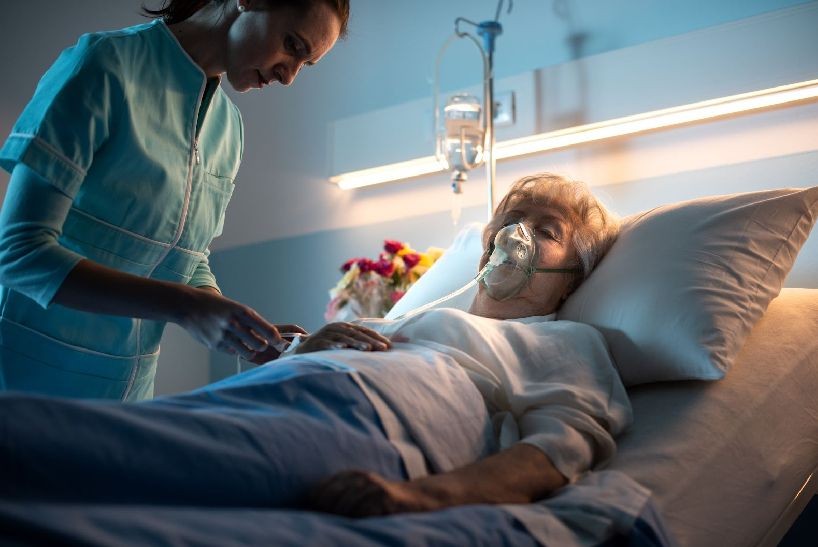Psychiatric Spitex
Specialist topics
Psychiatric Spitex - at the interface between outpatient and inpatient care
Spitex organizations are by no means only dedicated to clients with somatic diagnoses. Psychiatric care and support services are now also an integral part of the range of services provided by such facilities. Clients who need appropriate support turn to a psychiatric Spitex.

Such organizations are an integral part of a psychiatric network that also includes clinics and psychiatrists.
How has psychiatric Spitex developed?
Ever since Spitex organizations have existed, professionals have also been looking after clients who need support due to mental health problems. Initially, however, this was done unsystematically. But in recent years, more and more highly specialized teams have developed. As a result, Spitex has become an indispensable, integral part of the care of mentally ill people.

The employees take on two very important tasks, among others:
- Recognizing mental illness during actual somatic care
- Initiating appropriate care by Spitex
This function is of immense importance. Studies show that 43 percent of clients receiving somatic care from Spitex also have mental illnesses. However, these often remain undetected and those affected are therefore unable to receive the care they so urgently need.
Understanding of the importance of outpatient psychiatric care is growing both within the healthcare system and among the general public. Nevertheless, there is still a patchwork of psychiatric care in Switzerland. Some organizations employ staff with the highest level of expertise in the field of psychiatric care, while others employ none at all.
The process of acceptance of psychiatric nursing management is far from complete. Again and again, nurses report that their tasks are considered less important than somatic services. The latter must be done first. Only if there is still time afterwards can they devote themselves to psychiatric measures. Voices of this kind continue to hamper the acceptance of psychiatric Spitex.
Where does the still mixed reputation of psychiatric Spitex come from?
Psychiatric services are a comparatively young discipline. As a result, they have not yet been able to become as firmly integrated into the public image as somatic services. The image of the psychiatrist who simply talks to his clients is still widespread. But as we know, this is not the case.
People forget that verbal communication is one of the most important tools in the treatment of mental illness. In this way, the client's self-management can be promoted. They also gain important insights into how to deal with their own illness. However, all of this is only possible thanks to the specific skills of mental health professionals.
In addition, mental illnesses are generally not as visible as some somatic illnesses. For example, severe depression is difficult to recognize from the outside, whereas an arm in plaster due to a broken bone is immediately noticeable.
Recovery from an obvious illness is also clearly visible. In the case of mental illnesses, on the other hand, it is more noticeable and only if there is close direct contact with the person affected.
How does psychiatric Spitex bridge the gap between outpatient and inpatient care?

Spitex specialists work on an outpatient basis. This means that clients remain in their own four walls and therefore in their familiar surroundings. Nevertheless, they receive exactly the support they so urgently need to cope with everyday life.
Remaining in familiar surroundings is particularly valuable for people with mental illness. It gives them a sense of security and therefore a greater degree of inner peace. This can be crucial for the recovery process.
This is why inpatient facilities attach great importance to releasing their clients back into their normal lives as quickly as possible. However, this is usually only possible after a full recovery. Thanks to the option of continued outpatient care offered by psychiatric Spitex, this can potentially be achieved earlier.
Clients can continue to receive professional care at home and return to their everyday lives sooner. Inpatient facilities are therefore increasingly commissioning psychiatric Spitex organizations to assist with recovery. The skills of Spitex in this area are not yet recognized across the board. However, their importance is growing.
Spitex staff cannot always completely cure mental illness. But they support their clients in leading as self-determined a life as possible despite their limitations. This increases their quality of life immensely.
How does the targeted treatment of mental health care work?
First of all, the psychiatric Spitex specialists get to know the clients better. This usually takes place during a medical history interview. In this context, assessment tools such as interRAI CMH can be used to provide valuable information.
With the help of interRAI CMH, various aspects can be clarified, including
- Ability to cope with everyday life
- Social network
- Formal and informal support network
Predefined response categories help the professionals carrying out the assessment to record the situation in the best possible way. An algorithm is used to bundle the answers into a summary of the assessment. This shows where the problem areas lie and thus forms the basis for drawing up the individual care plan.
However, collecting information is not the only important part of the introductory meeting. Building a trusting relationship is essential. Clients must feel comfortable and safe in the presence of the professionals. Only then can they open up and accept help.
This is followed by the planning phase. This is where the referring party's instructions, for example those of an inpatient psychiatric facility, are taken into account. The client's personal wishes are also taken into account.
The Spitex specialists also determine the individual care requirements. Based on this, they then discuss the care goals and work out the measures to be taken. The staff also discuss which additional support services outside of psychiatric Spitex would be useful.
Once the treatment plan is being implemented, it is reviewed on an ongoing basis. This is the only way to ensure that it is optimally suited to the client's current state of health at all times. In this way, the psychiatric Spitex staff can guarantee the ideal treatment at all times in accordance with the individual's health development.
How to find the right psychiatric Spitex for your relative

Is your relative unable to cope with everyday life on their own due to a mental illness? Then it is not necessarily necessary to move to an inpatient facility. The staff of a psychiatric Spitex can also provide the necessary support at home.
With OPAN®, we offer you a platform for convenient online patient registration for various Spitex facilities. We reliably transmit registration information to your selected organization.
Once you have decided which Spitex you would like to use, you enter the initial personal details of the future client. Once this data has been transferred, an employee of the organization will contact you quickly. Together you will discuss the next steps and arrange an initial meeting.
We will be happy to answer all your questions about Spitex and outpatient care. Of course, we will also support you in using our platform. Please get in touch with us!
